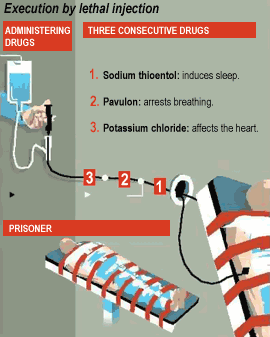British firm moves to end supply of execution drugs to US
May 15, 2013 - A UK pharmaceutical firm has announced that it is
"putting in place concrete steps" to stop the use of its drugs in
executions.
Hikma PLC, which is headquartered in London, made the announcement after it emerged that executioners at Arkansas Department of Corrections (DoC) had acquired drugs from the firm's subsidiary, West-Ward, which they intended to use to kill prisoners.
Arkansas had recently announced that it was moving to a new untested execution drug, called phenobarbital, after supplies of previously-used drugs were shut off.
Papers filed with courts in the US have pointed out that the untested nature of the new drug in this context may result in prisoners not necessarily being killed but instead left in a "vegetative state" or with "devastating injuries that will cause prolonged suffering."
In a statement released today, Hikma announced it was taking "concrete steps" to prevent "unintended uses" of its drugs:
"Phenobarbital is the world's most widely used anti-convulsant. Hikma strongly objects to the use of any of its products in capital punishment. The Company is putting in place concrete steps to restrict the supply of its products for unintended uses. It has ceased the direct sale of injectable phenobarbital to US departments of corrections and will work directly with its distribution partners to add restrictions for unintended use to its distribution contracts."
Maya Foa, Deputy Director of the Death Penalty team at Reprieve, said: "We are very pleased to hear that Hikma are actively working to prevent their drugs being used in executions. Their action, like that of many other companies before them, demonstrates that the pharmaceutical industry is not willing to see its drugs used to kill prisoners. Medicines are made to save and improve lives, not end them in executions. Departments of Correction in the US must take heed of this message."
Hikma's statement can be found on their website.
Papers filed with the Arkansas Circuit Court warn about the potential impact of using phenobarbital in executions in the manner proposed by Arkansas DoC – see especially pars 51-3.
Reprieve, a legal action charity, uses the law to enforce the human rights of prisoners, from death row to Guantánamo Bay. Reprieve investigates, litigates and educates, working on the frontline, to provide legal support to prisoners unable to pay for it themselves. Reprieve promotes the rule of law around the world, securing each person's right to a fair trial and saving lives. Clive Stafford Smith is the founder of Reprieve and has spent 25 years working on behalf of people facing the death penalty in the USA.
Hikma PLC, which is headquartered in London, made the announcement after it emerged that executioners at Arkansas Department of Corrections (DoC) had acquired drugs from the firm's subsidiary, West-Ward, which they intended to use to kill prisoners.
Arkansas had recently announced that it was moving to a new untested execution drug, called phenobarbital, after supplies of previously-used drugs were shut off.
Papers filed with courts in the US have pointed out that the untested nature of the new drug in this context may result in prisoners not necessarily being killed but instead left in a "vegetative state" or with "devastating injuries that will cause prolonged suffering."
In a statement released today, Hikma announced it was taking "concrete steps" to prevent "unintended uses" of its drugs:
"Phenobarbital is the world's most widely used anti-convulsant. Hikma strongly objects to the use of any of its products in capital punishment. The Company is putting in place concrete steps to restrict the supply of its products for unintended uses. It has ceased the direct sale of injectable phenobarbital to US departments of corrections and will work directly with its distribution partners to add restrictions for unintended use to its distribution contracts."
Maya Foa, Deputy Director of the Death Penalty team at Reprieve, said: "We are very pleased to hear that Hikma are actively working to prevent their drugs being used in executions. Their action, like that of many other companies before them, demonstrates that the pharmaceutical industry is not willing to see its drugs used to kill prisoners. Medicines are made to save and improve lives, not end them in executions. Departments of Correction in the US must take heed of this message."
Hikma's statement can be found on their website.
Papers filed with the Arkansas Circuit Court warn about the potential impact of using phenobarbital in executions in the manner proposed by Arkansas DoC – see especially pars 51-3.
Reprieve, a legal action charity, uses the law to enforce the human rights of prisoners, from death row to Guantánamo Bay. Reprieve investigates, litigates and educates, working on the frontline, to provide legal support to prisoners unable to pay for it themselves. Reprieve promotes the rule of law around the world, securing each person's right to a fair trial and saving lives. Clive Stafford Smith is the founder of Reprieve and has spent 25 years working on behalf of people facing the death penalty in the USA.
